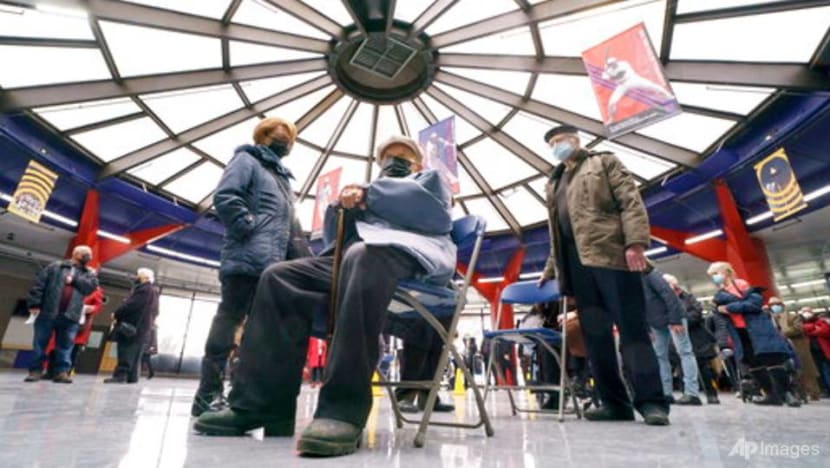Canada clears Johnson & Johnson COVID-19 vaccine, first to approve
Canada clears Johnson & Johnson vaccine, first to approve 4

People wait in line at a COVID-19 vaccine at a clinic at Olympic Stadium marking the beginning of mass vaccination in the Province of Quebec based on age in Montreal, on Monday, Mar 1, 2021. (Photo: APPaul Chiasson/The Canadian Press)
TORONTO: Canada's drug regulator has approved Johnson & Johnson's COVID-19 vaccine, the fourth such shot to be given the green light, the government said on Friday (Mar 5), amid frustration over the slow start to the country's inoculation program.
Health experts are eager for a one-and-done option to help speed vaccination. Canada has also approved vaccines from Pfizer, Moderna and AstraZeneca and Health Canada is the first major regulator to approve four different vaccines, said Dr Supriya Sharma, Health Canada’s chief medical adviser.
Like many countries, Canada does not have domestic production and has struggled with an immediate shortage of vaccines. The US so far isn’t allowing locally made vaccines to be exported, so Canada - like the other US neighbor, Mexico - has been forced to get vaccines from Europe and Asia.
Canada has pre-purchased 10 million Johnson & Johnson doses, with options to buy another 28 million. It was not immediately clear when Canada would get its first shipment.
“This is the fourth vaccine to be deemed safe by Canada's health experts - and with millions of doses already secured, we're one stop closer to defeating this virus,” Prime Minister Justin Trudeau tweeted.
READ: US authorises Johnson & Johnson's single-shot COVID-19 vaccine
The US approved Johnson and Johnson last month. The US Food and Drug Administration said J&J’s vaccine offers strong protection against what matters most: serious illness, hospitalisations and death.
One dose was 85 per cent protective against the most severe COVID-19 illness in a massive study that spanned three continents - protection that remained strong even in countries such as South Africa, where the variants of most concern are spreading.
J&J also is seeking authorisation for emergency use of its vaccine in Europe and from the World Health Organization. The company aims to produce about 1 billion doses globally by the end of the year. Last month, the island nation of Bahrain became the first to clear its use.
The vaccine shortage is so acute in Canada that provincial governments are now saying they will extend the interval between the two doses of Pfizer, Moderna and AstraZeneca vaccines to four months rather than three to four weeks so they can quickly inoculate more people.
“It is a reasonable recommendation. If we can get earlier doses, we don't have to wait for four months to give second doses if the supply opens up,” Sharma said.
Canadians 80 and above in the general public are only starting to get vaccinated this month and the National Advisory Committee on Immunisation said this week that extending the dose interval to four months would allow as many as 80 per cent of Canadians over the age of 16 to receive a single dose by the end of June simply with the expected supply of Pfizer-BioNTech and Moderna vaccines.
Second doses would begin to be administered in July as more shipments arrive, the panel said.
Canada also faces the prospect of vaccine delivery disruptions from the European Union. A shipment of over a quarter million AstraZeneca vaccines destined for Australia has been blocked from leaving the European Union in the first use of an export control system instituted by the bloc to make sure big pharma companies respect their local contracts.
J&J’s shot uses a cold virus like a Trojan horse to carry the spike gene into the body, where cells make harmless copies of the protein to prime the immune system in case the real virus comes along. It’s the same technology the company used in making an Ebola vaccine, and is similar to COVID-19 vaccines made by AstraZeneca and China’s CanSino Biologics.
The Pfizer and Moderna vaccines are made with a different technology, a piece of genetic code called messenger RNA that spurs cells to make those harmless spike copies.
BOOKMARK THIS: Our comprehensive coverage of the coronavirus outbreak and its developments
Download our app or subscribe to our Telegram channel for the latest updates on the coronavirus outbreak: https://cna.asia/telegram










